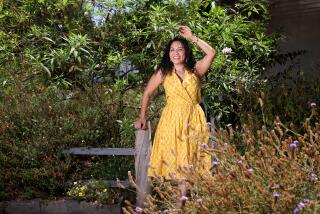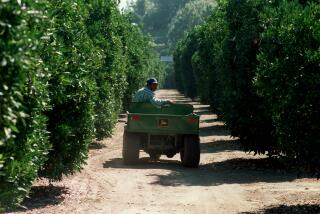Lawndale Garden Is Fertile Ground for Debate as Council Ponders Fate
A half-acre community garden in Lawndale is expected to be the center of debate next week when the City Council considers whether to retain it, convert it to a park or build a senior citizen housing project there.
Last month the Lawndale Parks and Recreation Commission unanimously recommended that a park be created at the 22,000-square-foot site at 160th Street and Sombra Avenue.
Few Agree on Plans
But few others--including residents who use the garden and council members who will decide the issue on Thursday--agree on plans for the site.
Three council members support a senior citizen housing project on the site, and one favors keeping the garden as it is. One of the council members who supports a housing project says the garden should be developed as a park in the interim. His colleagues disagree, saying that would be too expensive.
The garden, which is beside the San Diego Freeway, is a patchwork of cornstalks, rows of squash, tomatoes, onions, pumpkins, cucumbers and several unused parcels that have become overgrown with weeds and grass.
For $10, residents can rent a 20-by-20-foot parcel for six months. The city pays for water and trash removal. There are 45 parcels at the garden, nine of which are not being used right now, according to Larry Corrington, the cityâs director of recreation and community services.
Linda Pittman, a recreation supervisor, said the garden is used by young couples, families and senior citizens, some of whom use the vegetables they grow to help supplement their fixed income.
Mayor Sarann Kruse said in an interview that the community garden should be developed for senior-citizen housing because the city has a growing need for affordable housing for the elderly. She said the garden is a prime spot for such housing because it is within walking distance of shopping centers and public transportation.
Noise Problem
Acknowledging that traffic from the San Diego Freeway would create a great deal of noise, she said the problem could be mitigated with special sound-deadening building materials.
Kruse said that until a developer is found and financing is identified, she would like the site to remain a garden. Although the garden has become unsightly, the city does not have the money to put a park there, she said.
Councilwoman Carol Norman agreed that the site should remain a garden until developed for senior citizen housing. She said that a park built at the garden would not only be too small to be viable but that under state law the city cannot build a park and then convert it to another use.
Donna Radigonda, a spokeswoman for the state Department of Parks and Recreation, said state law provides that a park built with state funds can only be converted for other uses if state legislation is passed.
However, she said, if no state funds are used, the city can do as it pleases with the land.
Councilman Larry Rudolph agreed that the site should be developed for senior citizen housing, but said that in the interim the garden should be turned into a park.
Considered an Eyesore
Rudolph called the community garden an eyesore and said he thinks a park would be widely appreciated by residents in the area. He said he does not think its development would be very expensive: âHow much could it cost just to put some grass in there?â
Councilman Dan McKenzie said the city should delay building a senior-citizen project on the site until it has a chance to gauge the success of a 56-unit project that is scheduled to be built soon on 153rd Street.
The low-income project, which would be financed by a federal grant, was approved last year and is scheduled for completion by 1991, city officials said.
In the meantime, McKenzie said, the city does not have the money to build a park at the garden site and the garden would âget a lot more use than a little park.â
Councilman Harold E. Hofmann could not be reached for comment.
Ron Maxwell, a parks commissioner, said the site is too small for senior citizen housing and too close to the freeway.
He said such a housing project would have too few parking spaces and would increase traffic problems in the area.
Working Parcel for 3 Years
Willy Mojica, a 68-year-old retired aerospace worker and his wife, Felice, live across the street from the garden and have been working a parcel of land there for three years.
Mojica said they grow tomatoes, cabbage and onions, which they use for canning or offer as gifts to friends and relatives. âWe donât buy very many vegetables at the store,â he said.
Mojica said he does not oppose senior citizen housing or a park, but hopes the city retains the garden, which he and his wife visit almost daily.
Rod Soriano, a restaurant manager who has worked a parcel at the garden for a year, said the garden is too small for a senior citizen housing project but may be adequate for a park.
Still, he said, he hopes the city can retain the garden, where he grows broccoli, string beans, corn and tomatoes. âI do this for fun because I enjoy growing vegetables,â he said.
He said he also brings his two children to the garden occasionally to teach them about gardening and growing vegetables.
More to Read
Sign up for Essential California
The most important California stories and recommendations in your inbox every morning.
You may occasionally receive promotional content from the Los Angeles Times.











